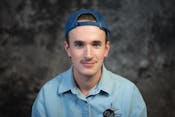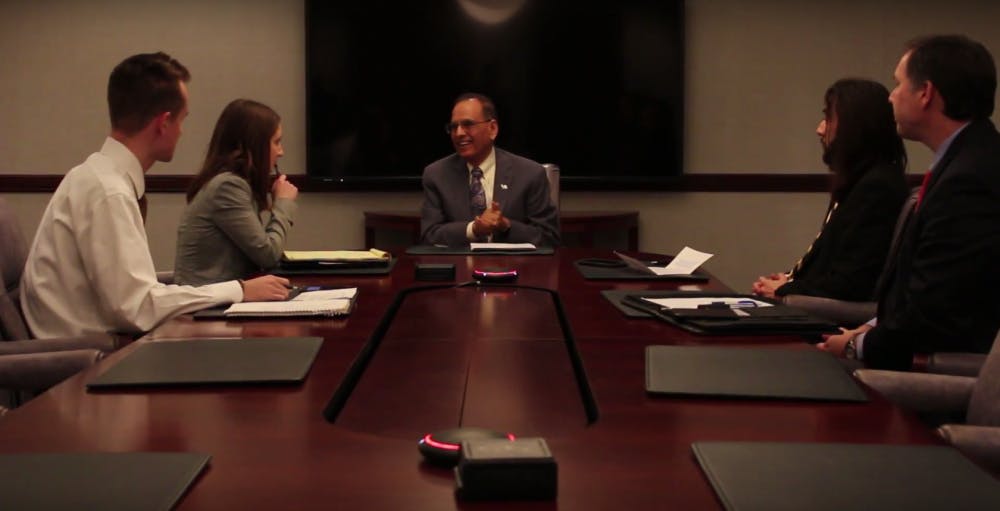UB President Tripathi thinks every student should take a computer science or statistics course before they graduate, he said after chuckling.
The Spectrum sat down with Tripathi on Monday to discuss campus safety after the recent threats in the nation, university projects and achievements, student voting trends and UB’s land use for roughly 45 minutes.
Tripathi on facility-based projects, demand for more campus housing, parking
Tripathi reiterated UB 2020 is “just a vision, not a timeframe” and said the university is looking to focus more on facility-based projects. Within a year, UB opened its medical campus last December along with opening 1Capen and 1Diefendorf and breaking ground for the football fieldhouse. With the future One World Café and a possible healthcare facility on North Campus, the university is looking to expand. “We have a lot of ambition, but we need to think about what the priorities are,” Tripathi said. Tripathi said there’s a demand for additional housing as enrollment increases, but there is no set plan yet. He said there is a current study to see whether housing should be added to North or South Campus, or to both campuses. There is no plan to place housing at the downtown campus, he said. The School of Engineering will also need more space as it grows, Tripathi said. He also said some facilities, such as Lockwood Library are fairly old and the university is looking at how to update the space. “We created the third floor [in the Silverman Library], which is almost 100 percent full almost all the time,” Tripathi said. “I think we’ve learned some lessons in terms of how do we create the spaces.” Tripathi could not provide an update on parking, but he said he will look into it more. “At every campus I’ve been to that has always been an issue,” Tripathi said. “That’s definitely something we’ll continuously have to look at.”
Tripathi on recent threats to national security
Tripathi said the university regularly holds active shooter trainings on North and South Campus. He said he thinks the university does a good job educating its students about what to do in a serious emergency.
Tripathi also said he appreciates the diversity of the student body’s viewpoints and that campus serves as a place for students to discuss their views, no matter what side of the political spectrum they fall on.
“I'm really so happy that different points of views have come on the campus and students have been very receptive, which is fantastic. At many campuses, that that's not the case,” Tripathi said. “We have an environment where all kinds of thoughts are welcome and people are willing to listen. People are willing to sort of think differently as well.”
Tripathi said UB’s active shooting trainers act as a model for others in the area. He takes pride in the preventative matters the university takes to educate its students, staff and faculty about what to do in high-risk situations.
“But you're never fully prepared for anything like that. And I think we're very active in and making sure [students are safe],” Tripathi said. “I mean, there are about 40,000 people here. It's like a small town. And we are always looking at the base to to make sure that we're safe, always looking at ways to have a place where people can talk about whatever they want to talk about.”
Tripathi on UB’s no-smoking policy
Tripathi reinforced his opinion that UB doesn’t have the ability to tell people that they can’t smoke on campus. Without state legislation, UPD can’t write citations for people who smoke, and it’s hard to distinguish who is a student, staff or faculty versus a visitor on campus.
Tripathi encourages members of the university community to speak up when they see someone smoking and let individuals know that UB is a smoke-free campus.
“Really the only thing we can do is to really educate people about the science so people don't smoke,” Tripathi said. “We had the [Breathe Free] committee, which did a good job [researching], and we want to [enforce] it, but right now we can’t without the legislation. I suggest if students see someone smoking on campus, speak up. I know I try to talk with students whenever I see them smoking outside one of the buildings on campus.”
Tripathi on UB’s commitment to New York State Open Meetings Law given the UB Council and the Student Association did not comply with the law, according to New York’s top open government official
Tripathi said UB follows public notice procedures and lets the public know about when and where meetings will be for the UB Council, UB’s advisory body. Tripathi said UB also uses livestreams for the meetings.
“So we can’t really change the meeting sites, right, on whim. The room may not have that technology,” Tripathi said. “In general, really, our council meetings have attracted two to three, three to four outside, unannounced people, not as many people that happened last time which is good –– actually –– because I think having interest in the meeting is good.”
Tripathi said UB is looking to have UB Council meetings in a location with more room, so people can be there and technology can stream the meetings.
“We are going to make sure there is plenty room and there are seats there for people, I think it’s important, it’s the law and New York State has very strong and good laws in what it should have,” Tripathi said.
Tripathi said occasionally, people can make mistakes but it’s important UB addresses those issues.
“It’s always been in the [conference room in the Office of the President], and this room is not big enough, and we can do it in the Buffalo Room, that’s what we’re looking at,” Tripathi said. “I don’t run those council meetings, there is a chair there but I think –– and I don’t [know] the exact words there –– but it’s not really for ‘public engagement’ as to see what’s going on but it is appointed by the governor, yes.”
Tripathi’s thoughts on the usage of the the 200 acres of land east of the Millersport Highway
Tripathi said he’s used the land, which gets crowded in the summertime when students aren’t around. Although he said it’s being used on some level, it could be examined in terms of recreation available for students.
“I’ve gone at least 100 times walking there, it’s a beautiful place to walk and the community is there, and so on,” Tripathi said. “If there is something more that you’re thinking about in terms of recreation, what it is that would make it better, then definitely I’d be happy to listen to that.”
Tripathi’s thoughts on the UB Card, the card’s abilities in data collection and predictive machines
Tripathi said he hasn’t personally looked at the data collected by the card, but he is aware of how people are digitally monitored today, overall. Tripathi said as Provost, he taught a freshman seminar on data mining, where he would inform students on the number of ways their data is collected through different sources.
“What we have to be careful about is that nobody is misusing that information without our knowledge,” Tripathi said. “If you give permission, like signing into Facebook, you can’t complain. But I think we should be careful in terms of information not being used without our consent.”
“The other part is if you take the personal identity out, if you think about usage of our library here [at UB], let’s assume you have a card when you come in. If you take your name out and we just look at the data, and use that data for better predictive and planning purposes, then it is actually –– without you as a person –– looking at the group, we can plan for more seats, we can see when it is being used and so on. But that information would be used for planning.”
Tripathi said what does impact students, however, is the sale of their name to third parties –– something he said UB does not do. But he does recognize the potential of data.
For example, Tripathi said one of the focuses on UB’s new Artificial Intelligence and Machine Learning institute, involves looking at bias in predictive machines.
“There’s an ethical issue, issues [on bias], or any of these predictive models and that’s really very critical. There’s a whole study where [researchers] looked at Google data for six months and tried to predict pancreatic cancer,” Tripathi said.
“This was research by Microsoft and Columbia. You go six months and you monitor the people who were diagnosed with pancreatic cancer now and look at their Google searches, seeing what they’re looking for. You could have predicted, with 20 percent accuracy, three or four months before these people would have pancreatic cancer just by our behavior.”
Tripathi said in terms of the Google research, it could cure a number of people and predict cancer early on.
“So think about the impact of that but at the same time, think about power of this kind of predictive analysis and what can it lead to in terms of ethics, in terms of biases, and that’s important. So I understand the issue you brought in, in terms of data and so on but I think my concern is twofold with any data [like that]: one is really the security of the data and the other one is what predictability it has.”
Tripathi said UB secures its data, but in today’s day and age, even with a “strong IT system” on security, nothing can be completely secure.
Benjamin Blanchet, Max Kalnitz and Hannah Stein are editors and can be reached news@ubspectrum.com and on Twitter @BenjaminUBSpec @Max_Kalnitz and @HannahJStein.

Benjamin Blanchet is the senior engagement editor for The Spectrum. His words have been seen in The Buffalo News (Gusto) and The Sun newspapers of Western New York. Loves cryptoquip and double-doubles.





